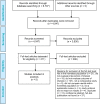Interventions to Improve Access to Primary Care for People Who Are Homeless: A Systematic Review
- PMID: 27099645
- PMCID: PMC4832090
Interventions to Improve Access to Primary Care for People Who Are Homeless: A Systematic Review
Abstract
Background: People who are homeless encounter barriers to primary care despite having greater needs for health care, on average, than people who are not homeless. We evaluated the effectiveness of interventions to improve access to primary care for people who are homeless.
Methods: We performed a systematic review to identify studies in English published between January 1, 1995, and July 8, 2015, comparing interventions to improve access to a primary care provider with usual care among people who are homeless. The outcome of interest was access to a primary care provider. The risk of bias in the studies was evaluated, and the quality of the evidence was assessed according to the Grading of Recommendations Assessment, Development, and Evaluation (GRADE) Working Group criteria.
Results: From a total of 4,047 citations, we identified five eligible studies (one randomized controlled trial and four observational studies). With the exception of the randomized trial, the risk of bias was considered high in the remaining studies. In the randomized trial, people who were homeless, without serious mental illness, and who received either an outreach intervention plus clinic orientation or clinic orientation alone, had improved access to a primary care provider compared with those receiving usual care. An observational study that compared integration of primary care and other services for people who are homeless with usual care did not observe any difference in access to a primary care provider between the two groups. A small observational study showed improvement among participants with a primary care provider after receiving an intervention consisting of housing and supportive services compared with the period before the intervention. The quality of the evidence was considered moderate for both the outreach plus clinic orientation and clinic orientation alone, and low to very low for the other interventions. Despite limitations, the literature identified reports of interventions developed to overcome barriers in access to primary care in people who are homeless. The interventions studied are complex and include multiple components that are consistent with proposed dimensions of access to care (availability, affordability, and acceptability).
Conclusions: Our systematic review of the literature identified various types of interventions that seek to improve access to primary care by attempting to address barriers to care encountered by people who are homeless. Moderate-quality evidence indicates that orientation to clinic services (either alone or combined with outreach) improves access to a primary care provider in adults who are homeless, without serious mental illness, and living in urban centres.
Figures
References
-
- Hwang SW, Aubry T, Palepu A, Farrell S, Nisenbaum R, Hubley AM, et al. The health and housing in transition study: a longitudinal study of the health of homeless and vulnerably housed adults in three Canadian cities. Int J Public Health. 2011; 56 (6): 609–23. - PubMed
-
- Gaetz S, Donaldson J, Richter T, Gulliver T. The state of homelessness in Canada [Internet]. Toronto: Canadian Homeless Research Network; 2013. [cited 2015 Sept 23]. Available from: http://www.homelesshub.ca/sites/default/files/SOHC2103.pdf
Publication types
MeSH terms
LinkOut - more resources
Full Text Sources
Medical


